Jing WANG, a PhD student in the department of Creative Technology, SciTech, just got a paper accepted by 26th International Joint Conference on Artificial Intelligence (IJCAi 2017). IJCAi (http://ijcai-17.org/), is a premier AI conference in the world. Jing’s paper, co-authored with Feng Tian (SciTech), Hongchuan Yu (FMC) and Changhong Liu (SciTech), “Multi-Component Nonnegative Matrix Factorization”, is one of the papers accepted, out of 2540 submissions, after going through an extremely selective review (acceptance rate: ~25%).
Yearly Archives / 2017
BRIAN Unavailable Today
 BRIAN is being upgraded and will be unavailable for use on Tuesday 2nd and Wednesday 3rd May.
BRIAN is being upgraded and will be unavailable for use on Tuesday 2nd and Wednesday 3rd May.
The main improvements from this upgrade include:
- New Impact Tracking Module
- New Homepage
- More User Friendly Navigation
The new and improved features will make BRIAN easier and simplier to use for everyone, whilst also providing a valuable tool to academics helping them record the impact of their research
All relevant guidance notes and video guides on the Staff Intranet will be updated in due course. If you need any help using the new system or if you encounter any problems after the upgrade, please do send an email to BRIAN@bournemouth.ac.uk and a member of staff will be able to assist you.
BRIAN training sessions are also available:
- Thursday 15th June 2017
With further dates planned. If you are interested to book on to any of these training sessions, please click here to book on!
In the meantime, if you do have queries relating to the upgrade, please get in touch with BRIAN@bournemouth.ac.uk
ADRC at National Dementia Action Alliance meeting in London
The Ageing and Dementia Research Centre (ADRC) was invited to join the National Dementia Action Alliance (DAA) Innovative Approaches to Dementia Care and Support event on Wednesday 19th April in London. Dr Michelle Heward represented ADRC at the event which provided an opportunity to connect with members of the National DAA and explore innovative approaches to dementia care and support.
The event was as co-chaired by Chris Roberts who lives with dementia, his wife and carer Jayne, and Neil Mapes (CEO of the charity Dementia Adventure). Throughout the event a range of speakers presenting new initiatives including John Craig (CEO of Care City); Dr. Ben Marathappu (Co-founder of the homecare provider Cera); University of Worchester’s peer support centres; SCIE’s augmented reality; and NHS Doncaster CCG innovative approaches to commissioning.
Discussion on the day focused on how these innovations might work in practice, as well as identifying the outcomes for people affected by dementia and their families.
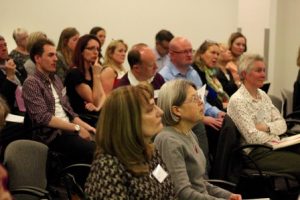
FMC Faculty Research Seminar Series 2016-17 *UPDATED*
Faculty of Media and Communication
Faculty Research Seminar Series 2016-17
May
at a Glance
A Journalism Research Group
Research Seminar
Venue: F309, Fusion Building, Talbot Campus, Bournemouth University, Fern Barrow, Poole, Dorset, BH12 5BB
Wednesday 10 May 2017 at 3pm
JRG
Welcomes:
Dr James Dennis – University of Portsmouth
“It’s Better to Light a Candle than to Fantasize About a Sun”: Social Media, Political Participation and Slacktivism in Britain
This presentation examines how routine social media use shapes political participation in Britain. Since the turn of the century, many commentators have argued that political activism has been compromised by “slacktivism,” a pejorative term that refers to supposedly inauthentic, low-threshold forms of political engagement online, such as signing an e-petition or “liking” a Facebook page. This is explored in three interrelated contexts, using three different research methods: an ethnography of the political movement, 38 Degrees; an analysis of a corpus of individually-completed self-reflective media engagement diaries; and a series of laboratory experiments that were designed to replicate environments in which slacktivism is said to occur. I argue that slacktivism is an inadequate and flawed means of capturing the essence of contemporary political action, as Facebook and Twitter create new opportunities for cognitive engagement, discursive participation, and political mobilisation.
Dr James Dennis is Senior Lecturer in Journalism at the University of Portsmouth. His research interests lie in political communication, with a particular focus on social media, political participation and citizenship, and digital news. His work has been published in the Civic Media Project, published by MIT Press, Participations: Journal of Audience & Reception Studies, and Political Studies. James maintains a personal research site at jameswilldennis.com, and can be found on Twitter at @jameswilldennis.
A Narrative Research Group
Research Seminar
Venue: F309, Fusion Building, Talbot Campus, Bournemouth University, Fern Barrow, Poole, Dorset, BH12 5BB
Wednesday 10 May 2017 at 4pm
NRG
Welcomes:
Dr Matthew Freeman – Bath Spa University
Small Change – Big Difference: Tracking the Non-Fictionality of Social Transmedia
Today’s convergent media industries readily produce stories across multiple media, telling the tales of Batman across comics, film and television, inviting audiences to participate in the Star Wars universe across cinema, novels, the Web, and more. This transmedia phenomenon may be a common strategy in Hollywood’s blockbuster fiction factory, tied up with ideas of digital marketing and fictional world-building, but transmedia is so much more than movie franchises. Yet while scholarship dwells on transmedia’s commercial, global industry formations (Jenkins, 2006; Scolari, 2009; Evans, 2011; Mann, 2014; Freeman, 2014), smaller communities and far less commercial cultures now make new and very different uses of transmedia, in some ways re-thinking transmedia by applying it to non-fictional projects as a socio-political strategy for informing and unifying local communities. There has been little attempt to track or understand such a socio-political idea of transmedia: Henry Jenkins (2006) famously theorised this phenomenon within a digital and industrial context, but what does it mean to examine transmedia from a social perspective?
In one sense, examining transmedia from a social perspective means thinking about it as a non-fictional engagement strategy that has ramifications in terms of people, leisure, activism, politics, and society itself. As such, this paper begins to theorise a social, non-fictional form of transmedia, pointing to Comic Relief in the UK and to political projects in Colombia to tease out the fabric of social transmedia campaigns. This includes re-thinking modes of participation, documentary and community media.
Dr Matthew Freeman is Senior Lecturer in Media and Communication at Bath Spa University, and Director of its Media Convergence Research Centre. He is the author of Historicising Transmedia Storytelling: Early Twentieth-Century Transmedia Story Worlds (Routledge, 2016), the author of Industrial Approaches to Media: A Methodological Gateway to Industry Studies (Palgrave Macmillan, 2016), and the co-author of Transmedia Archaeology: Storytelling in the Borderlines of Science Fiction, Comics and Pulp Magazines (Palgrave Pivot, 2014). His research examines cultures of production across the borders of media and history, and he has also published in journals including The International Journal of Cultural Studies, Historical Journal of Film, Radio and Television, and International Journal of Communication.
A Conflict, Rule of Law and Society
Research Seminar
Venue: F309, Fusion Building, Talbot Campus, Bournemouth University, Fern Barrow, Poole, Dorset, BH12 5BB
Wednesday 17 May 2017 at 3pm
CRoLS
Welcomes:
Mark “Max” Maxwell
Deputy Legal Counsel – U.S. Africa Command
A
Centre for Politics and Media Research
Seminar
Venue: F309, Fusion Building, Talbot Campus, Bournemouth University, Fern Barrow, Poole, Dorset, BH12 5BB
Wednesday 24 May 2017 at 3pm
Politics
Welcomes:
Prof James Martin – Goldsmiths
A
Centre for Politics and Media Research
Seminar
Venue: F309, Fusion Building, Talbot Campus, Bournemouth University, Fern Barrow, Poole, Dorset, BH12 5BB
Wednesday 24 May 2017 at 4pm
Politics
Welcomes:
Paul Reilly – University of Sheffield
A Promotional Cultures and Communication Centre
Research Seminar
Venue: F309, Fusion Building, Talbot Campus, Bournemouth University, Fern Barrow, Poole, Dorset, BH12 5BB
Wednesday 31 May 2017 at 3pm
PCCC
Welcomes:
Andrea Esser – Roehampton University
The Quiet Revolution: From Broadcasting and Advertising to Branded Entertainment
Efforts to endear brands to consumers go back as far as the 1920s, when branded entertainment was widespread on US radio and later television. In the UK advertiser-funded programming has no history. The public-service broadcasting remit demanded a clear separation between advertising and editorial content. But recent years have opened the doors to branded entertainment. The unregulated on-line mediascape offers endless possibilities and British broadcast legislation was revised in 2011 to allow for product placement. Building on an extensive analysis of trade journal articles since 2011, this paper seeks to illuminate recent developments and to build a theoretical framework by identifying drivers and tokens of change and different types of TV-related branded entertainment. History, I will argue, has left its mark. British broadcasters and TV producers seem to have been reluctant to embrace branded entertainment. But traditional content providers, like advertisers cannot escape the consequences of digitalization. Branded entertainment in multiple forms is revolutionising both marketing and the production and delivery of audiovisual content.
All are welcome and we look forward to seeing you there!
About the series
This new seminar series showcases current research across different disciplines and approaches within the Faculty of Media and Communication at BU. The research seminars include invited speakers in the fields of journalism, politics, narrative studies, literature, media, communication and marketing studies. The aim is to celebrate the diversity of research across departments in the faculty and also generate dialogue and discussion between those areas of research.
Contributions include speakers on behalf of
The Centre for Politics and Media Research
Promotional Cultures and Communication Centre
Centre for Public Relations Research and Professional Practice
Centre for the Study of Journalism, Culture and Community (JRG/NRG/Civic Media)
Centre for Intellectual Property Policy & Management
Conflict, Rule of Law and Society
EMERGE
Centre for Film and Television
New project with Poole Hospital NHS Foundation Trust in the SPB!
There is a new project from Poole Hospital NHS Foundation Trust in the Student Project Bank!
SPB0061: “I didn’t know that” – Good End of Life Care educational video for staff at Poole Hospital NHS Foundation Trust
Nationally and locally, the definition of End of Life Care is subjective and confused. The term End of Life is frequently associated with the last days or week or two of life, at which point the focus of care is invariably limited to aiming to ensure a good death. Good End of Life Care should focus on helping people who may be approaching end of life to Live Well. The true definition of End of Life Care is “all of the care received in the last year of life” (recognising that this could extend to more than a year, or be shorter).
Create a short information video that all staff at Poole Hospital will watch voluntarily. The video must be informative, but delivered in a very imaginative and fun way. Two key messages need to be communicated:
- End of Life Care is the last year of life not just when a person is dying
- End of Life Care is EVERYONE’S responsibility
Apply now
Projects are available to all undergraduate and postgraduate students at BU and can be used for their dissertation, assignment, unit or group work. Members of staff may also choose a project to set to their students. A complete list of projects is available here. Send us an email to request a project brief and application form.
COST Action news – your opportunity to join up!
 From wearable robots to black holes: get to know the 25 COST networks that kicked off this spring
From wearable robots to black holes: get to know the 25 COST networks that kicked off this spring
Throughout March and April, events took place for over 600 researchers and specialists from all over the continent, involved in 25 new networks. The 25 kick-offs were a chance for them to meet and set out their networks’ goals and priorities. The Actions will receive an estimated EUR 13 million for the usual timeframe of 4 years, helping them put their research networking activities into practice.
All the Actions include researchers and specialists from a broad range of scientific fields. Almost half of the network leaders (48%) indicated their research covered at least two main OECD fields of science and technology. Roughly half of the Actions (44%) mainly touch on natural sciences and medical and health sciences, while 24% are working in the field of engineering and technology and social sciences. The other Actions cover Agricultural sciences (16%) and humanities (4%).
Some of the topics include:
– personalised therapies for teenagers with mental disorders
– MRI biomarkers for diagnosing and treating chronic kidney disease
– wearable robots augmenting human motor functions
– crowdsourcing for language learning
– imaging techniques used in forensic science
– gravitational waves and black holes
Many of the above are relevant to researchers at BU.
The networks are growing, so if you are interested in playing an active role in an Action’s core group, find out more.
If you would like to simply participate in an Action’s networking activities, have a look at the COST networking tools first:
Contact your preferred Action’s Chair for details on how to sign up for such activities in the coming months.
See the whole list of new 25 COST Actions here (scroll down to see the links on this page)
If you are already involved in a COST Action, please contact Emily Cieciura, RKEO’s Research Faciltiator: EU & International, so that we can share your experience.
Health & Wellbeing in the 21st Century – it’s your responsibility 23rd May 2017 – LAST CHANCE TO BOOK

On Tuesday, 23rd May 2016, BU’s Research and Knowledge Exchange Office (RKEO) will be hosting a Sandpit event on Health & Wellbeing.
Which means…?
We’re seeking to come up with novel research which addresses challenges in health & wellbeing. With increasing pressure on the NHS, we need to consider how we can take responsibility for our own health & wellbeing. Potential areas to address this challenge may include but are not limited to, digital health & technology (apps, devices), sport, healthy diet & exercise, legal considerations (i.e. your body your choice), media, psychology, social care etc. We will also be joined by representatives from Public Health England, NHS England, and Project Nurture.
So, who should attend?
We want anyone who thinks they might have something to contribute. We will also be inviting relevant external attendees to contribute to the day.
What do I need to prepare in advance? What will the sandpit entail?
Absolutely nothing in advance. During the session, you’ll be guided through a process which results in the development of research ideas. The process facilitates creativity, potentially leading to innovative and interdisciplinary research ideas. These ideas will be explored with other attendees, and further developed based on the feedback received.
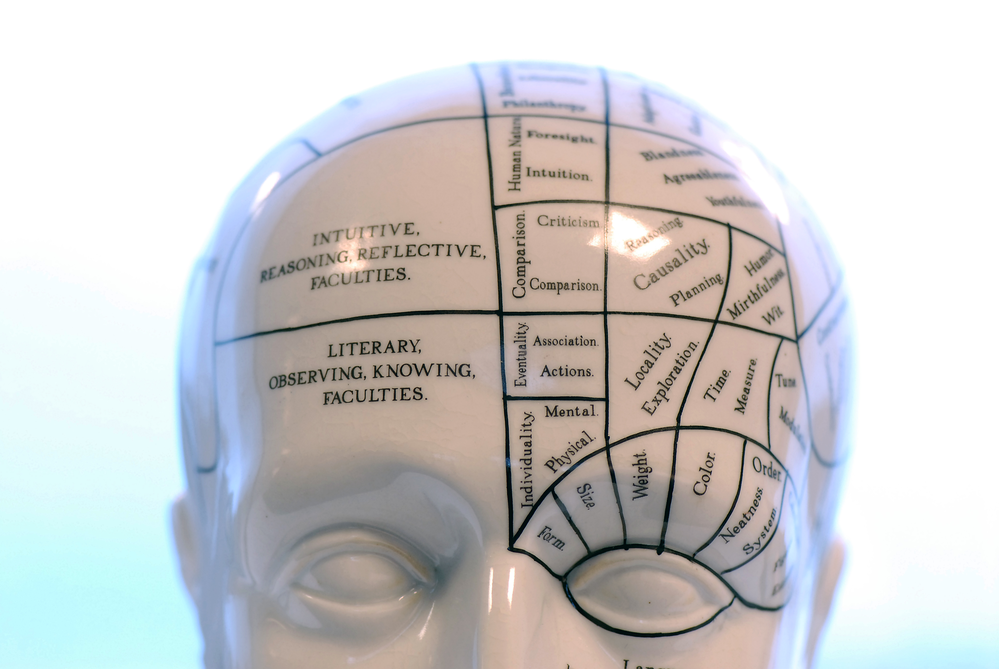
What if I don’t have time to think about ideas in advance?
You don’t need to do this but it will help. Attendees will come from a range of backgrounds so we expect that there will be lively conversations resulting from these different perspectives.
What about afterwards? Do I need to go away and do loads of work?
Well… that depends! The interactive day will result in some novel research ideas. Some of these may be progressed immediately; others might need more time to develop. You may find common ground with other attendees which you choose to take forward in other ways, such as writing a paper or applying for research funding.
What if my topic area is really specific, and doesn’t really relate to health?
Your contribution will be very welcome! One of the main benefits of this type of event is to bring together individuals with a range of backgrounds and specialisms who are able to see things just that bit differently to one another.
So, is this just networking?
Definitely not! It is a facilitated session with the primary intention of developing innovative research ideas, which also enables the development of networks. It gives you the opportunity to explore research ideas which you may develop over time, together with the chance to find common ground with academics from across BU and beyond.
So, how do I book onto this event?
To take part in this exciting opportunity, BU staff should complete the Application Form and return this to Dianne Goodman by Tuesday 2nd May. As places are limited, this will be assessed to ensure good mix of attendees with different perspectives. Places will be confirmed w/c 8th May 2017.
By applying, you agree to attend for the full duration of the event on 23rd May (c. 9:30 – 16:00). This event will be held in BU’s Executive Business Centre (EBC).
If you have any queries prior to submitting your application, please contact Lisa Gale-Andrews, RKEO Research Facilitator.
This event is part of the Research Knowledge Exchange Development Framework.
Strong Presence of BU at UK Kidney Week
BU research will be prominent at UK Kidney Week this summer in Liverpool. The conference is led by the Renal Association with the International Society of Nephrology (ISN) and the British Transplant Society (BTS). We’re delighted to have been invited to speak at the conference, which is a great opportunity to showcase our research as well as BU’s commitment to developing biomedical research themes. We’re also contributing several abstracts, detailing collaborations with the Universities of Bristol, Oxford and Osnabruck, Germany. The work focuses on the molecular cell biology of human podocytes, cells critical for our kidney’s role in blood filtration. When podocytes ‘fail’, kidney failure ensues.
We use Drosophila (fruit fly) genetics and molecular cell biology to address intractable problems associated with podocyte aging, podocyte dysfunction in diabetic nephropathy and several rare genetic mutations affecting podocytes that cause kidney failure in the young.
The work, was primarily funded by a Kidney Research UK Innovation Award and a British Heart Foundation Fellowship.
Dr. Paul Hartley.
HE policy update w/e 28th April 2017
The Higher Education and Research Bill – now the Higher Education and Research Act 2017– was finally passed on Thursday. As expected, the House of Commons rejected the Lords amendments, including those relating to the TEF and international students. The government did propose a number of amendments to address some of the issues raised in the Lords, and having been approved in the Commons, these were approved by the Lords, after some discussion.
- Although the Lords amendment removing the link between TEF and fees was rejected, the new amendment postpones the differentiated fee arrangements (which would have taken effect in 2019/20, using TEF year 3 ratings) until at least 2020/21.
- Another amendment has changed the approval process for inflation raised increases to fees, which will now need approval by both Houses of Parliament (instead of the current “negative” procedure).
- TEF year 2 will be subject to a formal and independent review, which will go beyond the “lessons learned” exercise that had been announced before. This will include a review of the ratings and the public interest benefit of the TEF – so may result in substantial changes.
- The Office for Students (OfS) can require cooperation between higher education providers and electoral officers a condition of registration – this was to address the amendment inserted by the Lords.
- The OfS must take advice from the designated quality assurance body when awarding degree awarding powers (DAPs) and must notify the Secretary of State when granting DAPs to institutions that haven’t previously had a validation agreement with another higher education provider or the OfS.
- When authorising use of ‘university’ title, the Secretary of State and OfS must consult with the representative bodies of higher education providers and students.
- The grounds for appealing a registration decision by the OfS have been broadened to address a rather woolly amendment in the Lords about appealing decisions because they were “wrong”.
- The new transparency duties will now include information that will be “helpful” for prospective international students.
Universities UK and GuildHE wrote a joint letter which generally supported the amendments and the Bill.
Teaching Excellence Framework: So despite hopes that the Lords amendments might result in more sweeping changes to the TEF, we will need to wait until the review, and an opportunity to provide feedback in the summer once the year 2 results have been published.
No more announcements have been made about subject level TEF which was due to be piloted over 2 years – starting with year 3, with submissions due in January 2018. With the general election holding up the year 2 results, timing for the review and guidance for year 3 will be very tight.
Subject to approval in each year, it seems likely now that all universities in the TEF will be able to raise fees by inflation in 2018/19 and 2019/20. It is important to remember that any university that does not qualify for TEF or chooses not to participate will have its fees capped at £9000 – the rises from previous years cannot be banked.
It was originally proposed that year 2 ratings (now due in June 2017) would last for three years – so unless there is a radical overhaul and everyone is required to resubmit in year 3, it seems likely that in year 3 participation may be restricted to those universities who choose to resubmit in the hope of increasing their ratings. So it will be interesting to see what happens to the pilot for subject level, whether more than one model is tested and whether participation is optional.
Universities UK published a blog clarifying the impact on fees after some sensational headlines linked to the Bill.
EU and International Students: The biggest issue in the Bill for UUK and GuildHE, and the issue most debated in the Lords on Thursday was international students. The long awaited consultation won’t happen now until after the election, we’ll see how quickly it will happen then – and what is said in the manifesto.
The House of Commons Education select committee report on the impact of Brexit on HE which recommended an immigration system that facilitates the needs of higher education, including a specialist route for academics other than Tier 2.
UUK have published a report on International Research Collaboration After the UK Leaves the European Union.
Benefits of Research Collaboration:
- Cross-nation collaboration increases citations and combined talents produce more innovative and useful outcome.
- The paper emphasises that the researchers themselves need to drive the collaboration. Sectors have different needs and Britain needs to collaborate with the countries with the richest talent and expertise. Funding needs to be well-structured and flexible to allow this.
- The paper says that the government should seek to access and influence the 9th Framework Programme (the Horizon successor), alongside new funding sources to incentivise collaborations with high-quality research partners beyond the EU.
- UUK call for a cross-government approach to supporting international research and the drawing together of the current disparate funding mechanisms.
Collaborative Partners
- The report notes that “Research undertaken with EU partners like Germany and France is growing faster than with other countries – hence while it is vital that the UK takes every opportunity to be truly global in their outlook, the importance of collaboration with EU partners should not be underestimated”.
- Almost all the growth in research output in the last 30 years has been brought about by international partnership.
Addressing Collaborative Barriers
Addressing the barriers to research collaboration is more than just funding, the report calls for:
- Better information on capabilities and strength of UK researchers
- National policy frameworks of all partners must be flexible enough to support international exchange, enabling critical human resources – including technical expertise – to flow between systems.
- The report highlights South Korea and Taiwan as attractive collaborators because of their research-intensive economies, strong technology investment, excellent university system, and high-English speaking rate. However, collaboration is challenged by geography, proximity and cultural differences. UUK report that communication problems are a key barrier alongside the uncertainty about research profiles of UK universities and significant differences in research governance.
- Policy and funding stability is essential – partners need to have confidence that the policy and funding environment will not be subject to unexpected or dramatic change after they have invested the time and resources necessary to develop productive and beneficial partnerships. Stability and certainty in both policy and funding environment is a key facilitator.
- Bilateral agreements with defined funding facilitated by a coordinated application process – the report effectively highlights the difficulties of ‘double jeopardy’ (Roberts, 2006) whereby all partners need to individually secure funding across a sustaining period to both commence and fully complete. Individuals make research choices that further their career and are fundable.
- Furthermore, UK research funding beyond the EU is highly dependent on the ODA budget which limits research themes and fundable countries. Post Brexit the UK needs new money without ODA type restrictions to support collaborations with partners not eligible for EU funds.
Note: UUK have also released a second report on whether free trade agreements can enhance opportunities for UK higher education post Brexit.
BRIAN Unavailable Today
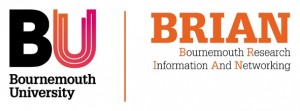 BRIAN is being upgraded and will be unavailable for use on Tuesday 2nd and Wednesday 3rd May.
BRIAN is being upgraded and will be unavailable for use on Tuesday 2nd and Wednesday 3rd May.
The main improvements from this upgrade include:
- New Impact Tracking Module
- New Homepage
- More User Friendly Navigation
The new and improved features will make BRIAN easier and simplier to use for everyone, whilst also providing a valuable tool to academics helping them record the impact of their research
All relevant guidance notes and video guides on the Staff Intranet will be updated in due course. If you need any help using the new system or if you encounter any problems after the upgrade, please do send an email to BRIAN@bournemouth.ac.uk and a member of staff will be able to assist you.
BRIAN training sessions are also available:
- Thursday 15th June 2017
With further dates planned. If you are interested to book on to any of these training sessions, please click here to book on!
In the meantime, if you do have queries relating to the upgrade, please get in touch with BRIAN@bournemouth.ac.uk
Recent Writing from Kip Jones Available on the Internet

“Kyle’s photo-montage of black and white clippings, mostly from fashion magazines, Bailey and Avedon, etc., glued to the walls surrounding his bed”.
Kip Jones is pleased to announce that the tripartite story, “True confessions: why I left a traditional liberal arts college for the sins of the big city”, first published in Qualitative Research Journal, is available on Academia.edu. Jones is particularly pleased that what is now called ‘auto-fiction’ has been accepted for publication by such a major qualitative journal. The three stories in the article conclude with a scene from Jones’ ongoing development of the feature film script for “Copacetica”. All three stories portray aspects of the sexual fumbling and romantic insecurities typical in youth.

“Dirty Frank’s” bar, Philadelphia, where the main characters of “Copacetica” frequently meet.
The second piece of writing consists of the bar scene from “Copacetica”. This is the scene in which all the major characters are introduced and the story sets up the conundrum that the main character will face in the film.
“Copacetica” tells the tale of a gullible youth on a roller coaster ride of loss of innocence and coming out in the flux and instability of 1960s hippy America. Often seen as a period of revolution in social norms, Copacetica’s themes include being different, the celebration of being an outsider, seeing oneself from outside of the “norm”, and the interior conflicts of “coming out” within a continuum as a (gay) male in a straight world. These observations are set within the flux and instability of a period of great social change, but which are often viewed in retrospect as consistent and definable. Being straight or being gay can also be viewed in a similar way within the wider culture’s need to set up a sexual binary and force sexual “choice” decision-making for the benefit of the majority culture, or ‘heteronormativity’. Through the device of the fleeting moment, the story interrogates the certainties and uncertainties of the “norms” of modernity.
In the later gallery scene (not yet published), a minor character explains the meaning of the word, “copacetic”:
VISITOR TWO What d’he say? VISTOR ONE “Everything’s copacetic”! (Beat) What does that mean, anyway? VISITOR THREE Everything’s cool. Everything’s okay. Or “Groovy” as they like to say.
Asked what he enjoyed about writing the script for this film, Jones said, “Definitely revisiting the slang used by youth of the 1960s! It’s virtually its own language. And writing the sex scenes. Exciting and very tiring. Almost like the real thing”.
You can read the opening scene planned for the film on KIPWORLD: “Copacetica” Scene 1. EXT SUBURBAN HOUSE POOL NIGHT
Photo of the Week: The Compound Eye of Calliphora Vomitoria (a bluebottle fly)
The Compound Eye of Calliphora Vomitoria (a bluebottle fly)
Our next instalment of the ‘Photo of the Week’ series features Christopher Dwen’s image of the compound eye of calliphora vomitoria (a bluebottle fly). The series is a weekly instalment which features an image taken by our fantastic BU staff and students. The photos give a glimpse into some of the fascinating work our researchers have been doing across BU and the wider community.
Christopher’s research looks at the blood feeding activity of calliphora vomitoria (bluebottle flies) at crime scenes. This activity can often be confounding.
Experiments were conducted to investigate the blood feeding activity and blood artefact patterns created by the flies following a blood meal. The trials were undertaken in a staged environment where over 500 flies were exposed to 500ml of horse blood in a sealed gazebo for a period of 72 hours.
The resulting patterns, a total of 539,507 fly blood artefacts, were then compared to recreated bloodstain patterns commonly encountered during instances of violent assault. These comparisons focused on overall pattern shape, total stain numbers, stain density per cm2 and the zone where they were deposited. Informal observations and recordings were also made of individual stain colour and stain alignment, but were not measured.
If you’d like find out more about the research or the photo itself then please contact Christopher.
This photo was originally an entry to the 2017 Research Photography Competition. If you have any other questions about the Photo of the Week series or the competition please email research@bournemouth.ac.uk
ESRC Festival of Social Science 2017 – Apply now!
 We’re waiting for your applications for ESRC Festival of Social Science until 5 pm on Friday 5th May.
We’re waiting for your applications for ESRC Festival of Social Science until 5 pm on Friday 5th May.
To apply, please complete the application form which can be downloaded from the staff intranet and send it to FestivalofSocialScience@bournemouth.ac.uk
Please contact Joanna Pawlik (jpawlik@bournemouth.ac.uk) or Genna West (gwest@bournemouth.ac.uk) if you would like to discuss your event idea or for further information.
We look forward to hearing from you
Research Professional – all you need to know
 Every BU academic has a Research Professional account which delivers weekly emails detailing funding opportunities in their broad subject area. To really make the most of your Research Professional account, you should tailor it further by establishing additional alerts based on your specific area of expertise. The Funding Development Team Officers can assist you with this, if required.
Every BU academic has a Research Professional account which delivers weekly emails detailing funding opportunities in their broad subject area. To really make the most of your Research Professional account, you should tailor it further by establishing additional alerts based on your specific area of expertise. The Funding Development Team Officers can assist you with this, if required.
Research Professional have created several guides to help introduce users to ResearchProfessional. These can be downloaded here.
Quick Start Guide: Explains to users their first steps with the website, from creating an account to searching for content and setting up email alerts, all in the space of a single page.
User Guide: More detailed information covering all the key aspects of using ResearchProfessional.
Administrator Guide: A detailed description of the administrator functionality.
In addition to the above, there are a set of 2-3 minute videos online, designed to take a user through all the key features of ResearchProfessional. To access the videos, please use the following link: http://www.youtube.com/researchprofessional
Research Professional are running a series of online training broadcasts aimed at introducing users to the basics of creating and configuring their accounts on ResearchProfessional. They are holding monthly sessions, covering everything you need to get started with ResearchProfessional. The broadcast sessions will run for no more than 60 minutes, with the opportunity to ask questions via text chat. Each session will cover:
-
Self registration and logging in
-
Building searches
-
Setting personalised alerts
-
Saving and bookmarking items
-
Subscribing to news alerts
-
Configuring your personal profile
Each session will run between 10.00am and 11.00am (UK) on the fourth Tuesday of each month. You can register here for your preferred date:
These are free and comprehensive training sessions and so this is a good opportunity to get to grips with how Research Professional can work for you.
THET-funded mental health training dissemination in Kathmandu
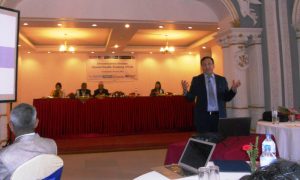 On the last day of April we presented our key findings from the THET-funded project on Mental Health Training for Rural Community-based Maternity Care Workers in Nepal. The session in Hotel Yak & Yeti in central Kathmandu was jointly organised by Tribhuvan University with Bournemouth University and Liverpool John Moores University (LJMU). Mental health is high on the global agenda and increasingly so in Nepal. Mental health in pregnant women and new mothers is increasing recognised across the world. However, for many people in Nepal mental health problems are still difficult topics to discuss.
On the last day of April we presented our key findings from the THET-funded project on Mental Health Training for Rural Community-based Maternity Care Workers in Nepal. The session in Hotel Yak & Yeti in central Kathmandu was jointly organised by Tribhuvan University with Bournemouth University and Liverpool John Moores University (LJMU). Mental health is high on the global agenda and increasingly so in Nepal. Mental health in pregnant women and new mothers is increasing recognised across the world. However, for many people in Nepal mental health problems are still difficult topics to discuss.
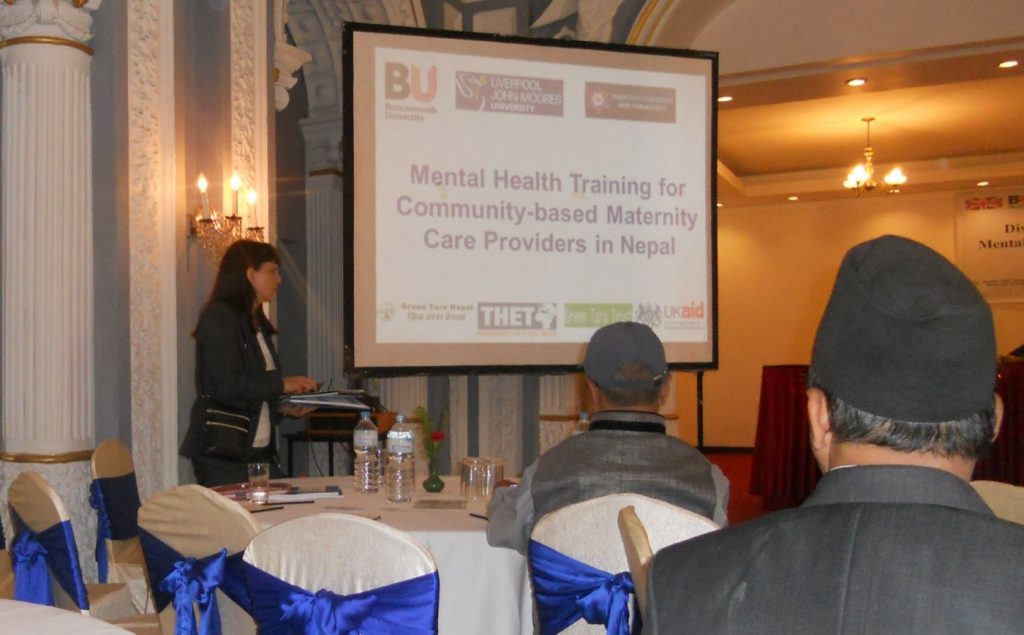 The team presented slides on mental health in maternity care issue, the curriculum review, the intervention and the volunteers and various aspects of the evaluation. The slide (below) highlighting a few mishaps with UK volunteers definitely got the most laughs.
The team presented slides on mental health in maternity care issue, the curriculum review, the intervention and the volunteers and various aspects of the evaluation. The slide (below) highlighting a few mishaps with UK volunteers definitely got the most laughs. 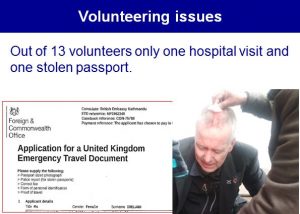
The three universities have been working together training Auxiliary Nurse Midwives in Nawalparasi on key aspects of mental health and mental health promotion. The project led by Bournemouth University was funded under the Health Partnership Scheme (HPS) which is managed by a London-based organisation called THET (Tropical Health & Education Trust).
Prof. Vanora Hundley from FHSS was one of the key speakers commenting on the intervention, the research and its findings. The audience also heard from two of the ANMs who had been in the training and the chief nurse in the district about there views on the UK volunteers and their training sessions. To date the work has resulted in three academic publications, all are Open Access journals. [1-3]
Prof. Edwin van Teijlingen
CMMPH
References:
- Simkhada, B., Sharma, G., Pradhan, S., van Teijlingen, E., Ireland, J., Simkhada, P., Devkota, B. & the THET team. (2016) Needs assessment of mental health training for Auxiliary Nurse Midwives: a cross-sectional survey, Journal of Manmohan Memorial Institute of Health Sciences 2(1): 20-26. http://www.nepjol.info/index.php/JMMIHS/article/view/15793/12738
- Simkhada, P., van Teijlingen E., Winter, R.C., Fanning, C., Dhungel, A., Marahatta S.B. (2015) Why are so many Nepali women killing themselves? A review of key issues Journal of Manmohan Memorial Institute of Health Sciences 1(4): 43-49. http://www.nepjol.info/index.php/JMMIHS/article/view/12001
- van Teijlingen, E., Simkhada, P., Devkota, B., Fanning, P., Ireland, J., Simkhada, B., Sherchan, L., Silwal, R.C., Pradhan, S., Maharjan, S.K., Maharjan, R.K. (2015) Mental health issues in pregnant women in Nepal. Nepal Journal of Epidemiology 5(3): 499-501. http://www.nepjol.info/index.php/NJE/article/view/13607/11007
Latest Funding Opportunities

The following is a snap-shot of funding opportunities that have been announced. Please follow the links for more information:
NERC
Evidence synthesis training pilot scheme
NERC invites proposals to deliver training to early career researchers and PhD students at the point of submission relevant to the theme of evidence synthesis to inform policy and business decision-making, developed and delivered in collaboration with the users of NERC research.
Maximum Award: Unspecified
Deadline: 13 June 2017
EPSRC
Cross-disciplinarity & Co-creation in ICT Research
This call seeks to encourage active collaboration between researchers working in different disciplines and/or with users of research. The ICT landscape has rich opportunities for closer working between disciplines and many of the most exciting opportunities emerge at the interface between established areas.
Maximum Award: Unspecified
Deadline: 14 June 2017
Royal Society
International Exchanges Scheme – France cost share programme
This scheme is for scientists based in the UK (or US for the Kan Tong Po programme) who want to stimulate new collaborations with leading scientists overseas through either a one-off visit or bilateral travel.
Maximum Award: £12000
Deadline: 15 June 2017
Wellcome Trust
These awards support researchers who are transforming great ideas into healthcare innovations that could have a significant impact on human health.
The current focus areas are mental health, neurological disorders and neglected tropical diseases.
Maximum Award: £500000
Deadline: Open
Cultural Heritage
The Digital Heritage call will support well-defined, transnational, interdisciplinary and collaborative research and development projects that maximise the value and impact of research outcomes by promoting the Exchange with policy makers, businesses and commercial enterprises, the broader Heritage sector, voluntary and community groups and the general public.
Maximum Award: Unspecified
Deadline: 22 June 2017
Wave Energy Scotland
Fourth Innovation funding call for Control Systems
Advanced control systems have the potential to play a vital role in the realisation of cost-effective Wave Energy generation technology. WES wishes to realise this potential through this innovation call for Control Systems, starting with funding for Feasibility Studies and progressing to design, development and demonstration activities.
Maximum Award: £47000
Deadline: 12 June 2017
British Council
Promoting & Responding to Maternal, Neonatal, Child & Adolescent Health
Funder is now inviting early career researchers from the UK, South Africa or Kenya to apply for this workshop.
Maximum Award: Unknown
Deadline: 30 June 2017
NIHR
Public Health Research Programme Researcher-led (evidence synthesis)
The primary aim of the programme is the evaluation of practical interventions. The funder will fund both primary research (mainly evaluative, but also some preparatory research) and secondary research (evidence synthesis); precise methods will need to be appropriate to the question being asked and the feasibility of the research.
Maximum Award: Unknown
Deadline: 25 July 2017
If you are interested in submitting to any of the above calls you must contact your RKEO Funding Development Officer with adequate notice before the deadline.
For more funding opportunities that are most relevant to you, you can set up your own personalised alerts on Research Professional. If you need help setting these up, just ask your School’s/Faculty’s Funding Development Officer in RKEO or view the recent blog post here.
If thinking of applying, why not add notification of your interest on Research Professional’s record of the bid so that BU colleagues can see your intention to bid and contact you to collaborate.
Last Day To Use BRIAN Before Upgrade!
 Today is the last (working) day you can use BRIAN before it is upgraded. BRIAN will be unavailable for use on Tuesday 2nd and Wednesday 3rd May.
Today is the last (working) day you can use BRIAN before it is upgraded. BRIAN will be unavailable for use on Tuesday 2nd and Wednesday 3rd May.
The main improvements from this upgrade include:
- New Impact Tracking Module
- New Homepage
- More User Friendly Navigation
The new and improved features will make BRIAN easier and simplier to use for everyone, whilst also providing a valuable tool to academics helping them record the impact of their research
All relevant guidance notes and video guides on the Staff Intranet will be updated in due course. If you need any help using the new system or if you encounter any problems after the upgrade, please do send an email to BRIAN@bournemouth.ac.uk and a member of staff will be able to assist you.
BRIAN training sessions are also available:
- Thursday 15th June 2017
With further dates planned. If you are interested to book on to any of these training sessions, please click here to book on!
In the meantime, if you do have queries relating to the upgrade, please get in touch with BRIAN@bournemouth.ac.uk
Primary Healthcare Workshop in Nepal
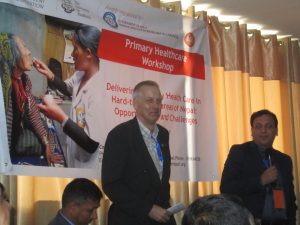 This week professors Vanora Hundley and Edwin van Teijlingen from the Centre for Midwifery, Maternal & Perinatal Health (CMMPH) were invited to the Primary Healthcare Workshop in Kathmandu. This Primary Healthcare Workshop ‘Delivering Primary Health Care in hard-to-reach areas of Nepal: Opportunities & Challenges’ was organised by the non-governmental organisation PHASE and the Nepal Health Research Council (NHRC). Prof. Edwin van Teijlingen and BU Visiting Professor Padam Simkhada (who is based at Liverpool John Moores University) were invited to offer an international perspective on this workshop held in coordination with the Ministry of Health, Nepal.
This week professors Vanora Hundley and Edwin van Teijlingen from the Centre for Midwifery, Maternal & Perinatal Health (CMMPH) were invited to the Primary Healthcare Workshop in Kathmandu. This Primary Healthcare Workshop ‘Delivering Primary Health Care in hard-to-reach areas of Nepal: Opportunities & Challenges’ was organised by the non-governmental organisation PHASE and the Nepal Health Research Council (NHRC). Prof. Edwin van Teijlingen and BU Visiting Professor Padam Simkhada (who is based at Liverpool John Moores University) were invited to offer an international perspective on this workshop held in coordination with the Ministry of Health, Nepal. 
Edwin made a comparison between the difficulties in access to primary care, recruiting and retention of staff in remote Nepal and his previous work on maternity care in remote and rural Scotland. He argued that some of these issues are universal, but more difficult to deal with in low-income countries like Nepal. The workshop took place at the Nepal Health Research Council.
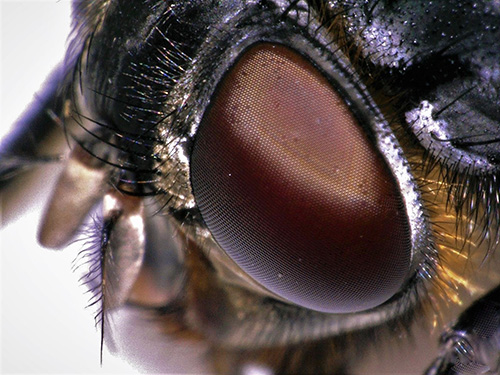











 May’s Research Café – Showcasing tomorrow’s researchers
May’s Research Café – Showcasing tomorrow’s researchers Bridging the Digital Divide: How Older Adults Navigate a Digital Society
Bridging the Digital Divide: How Older Adults Navigate a Digital Society ADRC launches new DEALTS2 train-the-trainer video series
ADRC launches new DEALTS2 train-the-trainer video series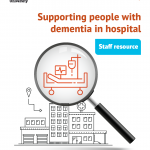 Insight Dementia educational resource: now available!
Insight Dementia educational resource: now available! Horizon Europe 2025 Work Programme pre-Published
Horizon Europe 2025 Work Programme pre-Published MSCA Postdoctoral Fellowships 2025
MSCA Postdoctoral Fellowships 2025 Update on UKRO services
Update on UKRO services European research project exploring use of ‘virtual twins’ to better manage metabolic associated fatty liver disease
European research project exploring use of ‘virtual twins’ to better manage metabolic associated fatty liver disease